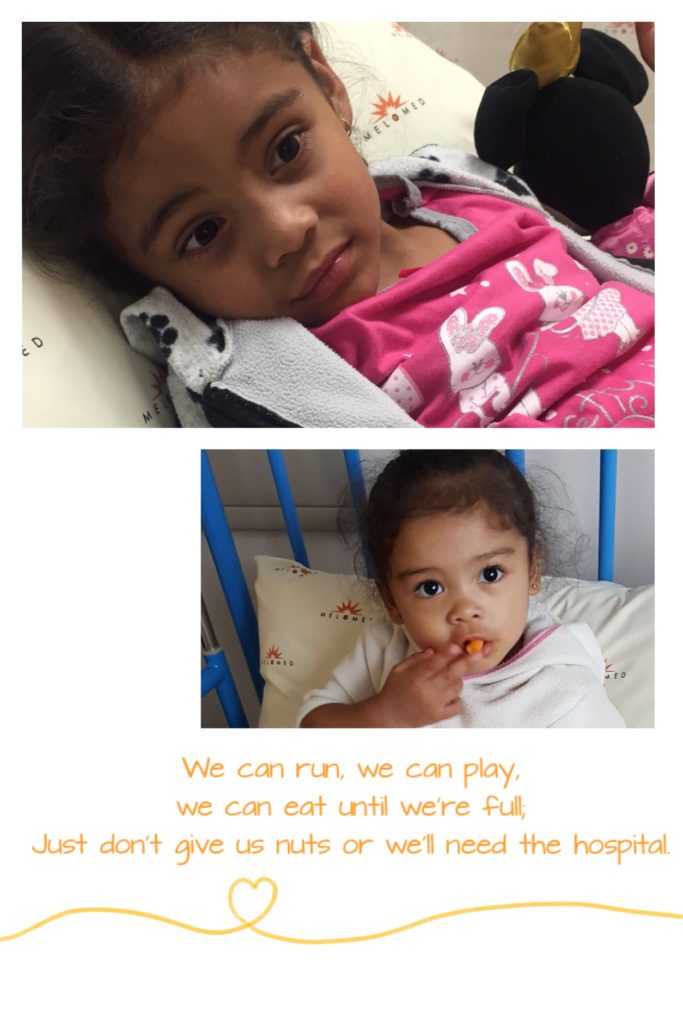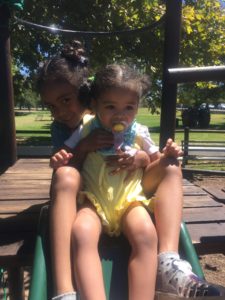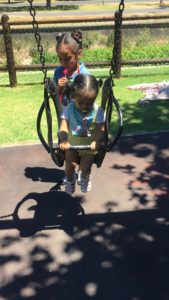Today’s blog post is written by South African mom blogger Ferowza Bowren who blogs at The Kaleidoscope Effect.
 It’s easy to conjure up the image of someone sneezing away when a cat walks by, or scratching at red patches of skin as if they’ve just walked through a bush of poison ivy. But allergies, and more specifically allergic reactions, are more than just an itch or a sneeze. Reactions can vary from a skin rash to anaphylaxis, which can be a life-threatening reaction if not properly and promptly treated. Allergies therefore require careful management, especially in children who cannot manage allergies on their own. Allergies in children have become increasingly common, and considering that 40% of allergy sufferers in South Africa are children (according to AFSA), it is important to not be left in the dark, especially as a parent or a person who works with children.
It’s easy to conjure up the image of someone sneezing away when a cat walks by, or scratching at red patches of skin as if they’ve just walked through a bush of poison ivy. But allergies, and more specifically allergic reactions, are more than just an itch or a sneeze. Reactions can vary from a skin rash to anaphylaxis, which can be a life-threatening reaction if not properly and promptly treated. Allergies therefore require careful management, especially in children who cannot manage allergies on their own. Allergies in children have become increasingly common, and considering that 40% of allergy sufferers in South Africa are children (according to AFSA), it is important to not be left in the dark, especially as a parent or a person who works with children.
My husband and I are parents of children with allergies – eczema and nuts (peanuts and tree nuts). We recently have experienced two separate episodes of each of our daughters (ages 4.5 years and 21 months) being treated at the ER (and needing to stay overnight for observation) as a result of allergic nut reactions. As a parent, I know that this type of episode cannot be avoided, but I find that being equipped puts me in a space where I understand the situation and can mitigate the risk factors. Books can be written on the subject of allergies in children, but here I some up my tips and learnings into a few key points in the hope that another parent or child caregiver can benefit from the experiences.
KNOW THEIR ALLERGY(IES) AND UNDERSTAND THE RISKS
Avoid assuming that your allergies, or lack thereof, will be shared by your children. Children need to be exposed to allergens to identify the types of food and/or stimuli to avoid. Sure, you can do broad spectrum or specific allergy tests upfront, but this can become expensive.
After my oldest had a reaction to peanut butter, my husband mentioned he had a peanut allergy as a child. I mentioned to the paediatrician that had I known this I would’ve avoided giving her peanut butter. He advised that allergies parents have, or don’t have, is not an indicator of an allergy that the child will or will not have. He told me that the best way to know is for a child to be exposed to an allergen, and/or to be tested.
EXPOSING YOUR CHILD(REN) TO ALLERGENS
- Do not introduce multiple allergens at a time: introduce one allergen at a time, waiting a day or so between introducing another allergen in order to check for reactions.
- Introduce allergens in your comfort zone: avoid introducing allergens in an area you are not familiar with, like at a kids party at a venue you’ve never been before. Introduce allergens in a place you are most comfortable, where you know where your nearest doctor or emergency rooms are, and when you are able to easily get in the car and get to a doctor or ER.
- Have medication on hand: ensure you have some basic allergy medication on-hand, such as Allergex syrup, to administer in the event of a reaction. You will still need to head to the doctor or ER, but you at least have some medication to alleviate some of the reaction.
- Common allergens: eggs, dairy, fish, wheat, peanuts, tree nuts (includes cashews, brazils, almonds, macadamias, pecans, pistachios, hazelnuts and walnuts. Click here for the full list of tree nuts.
GET TESTED
There are also different ways allergies are tested – skin-prick tests or tests done using blood taken from the child. Speak to your paediatrician for guidance on which test is best, and when to test. I was advised by a paediatrician that it is best not to test before the age of 2 years as the child still has their mother’s antibodies in their system until then.
And then brace yourself – it can be a traumatic experience (there are needles involved). Stay as calm as you can during the process and have age-appropriate distractions for your child while being tested – so take your child’s favourite toy, a lollipop and their dummy if they use one. Please don’t freak out at the nurses if your child bursts into tears or has a screaming episode; they’re only trying to help and it’s easier for them to work when the parents allow them to. 🙂
UNDERSTAND YOUR ALLERGY RISKS
If your child is allergy-free, go ahead and enjoy a sigh of relief. If not, don’t fret – you are not alone and there are plenty of sources of information and support around to help you manage your child’s allergies.
Ask your paediatrician to walk you through the test results and explain what it means. There are varying degrees of sensitivity to allergens. Some children need to ingest an allergen or come into direct contact with it to trigger a reaction. Other children are more sensitive and can show signs of reaction from just being near the allergen. Reactions can vary in terms of the way they manifest as well as in terms of their severity. Reactions can include a rash, red blotchy itchy patches of skin, swollen areas on the body or face, swollen tongue, even trouble breathing. Reactions can also increase in severity, with the first reaction being mild (a sign that there may be an allergy) while the second is usually more severe and can include mild anaphylaxis. Speak to your paediatrician if your child does have an allergy and use the opportunity to ask whatever questions you may have.
It is also important to note that children who have an allergy may be predisposed to developing other medical conditions, or the other way around. Children with eczema, for example, sometimes have a food allergy or develop asthma. This means that you may need to consult with multiple specialists, but use your paediatrician as a first point of contact. The process can be expensive, especially if you do not have medical aid or your medical aid plan does not cover you in full, but as a parent of two daughters who have eczema and nut allergies, I can definitely vouch for the value obtained from getting advice from a paediatrician and dermatologist.
SPREAD AWARENESS
One of the most important things you can do is to equip people with information about your child’s allergy and/or medical condition.
WHO NEEDS TO KNOW
The people who absolutely need to know about your child’s allergy are the ones who come into regular contact with your child, and who spends time with your child in your absence. This group includes: the grandparents, the aunts and uncles, fellow parents who invite your child for play dates or birthday parties, nannies and au pairs, child care givers at the day care and aftercare, teachers at school, instructors at extra murals.
Although it is important to make the adults aware who interact with your child regularly, it is equally important, perhaps even more important, to make your child aware of their own allergies.
HOW TO SPREAD AWARENESS
 When it comes to spreading awareness amongst the adults your child comes into contact with, the simplest is just to talk about it. Don’t shy away from making people aware of your child’s allergy; there really is nothing to be ashamed of. When you are leaving your child with someone be sure to advise or remind them that your child has an allergy, and provide basic medication, your contact number and another emergency contact number.
When it comes to spreading awareness amongst the adults your child comes into contact with, the simplest is just to talk about it. Don’t shy away from making people aware of your child’s allergy; there really is nothing to be ashamed of. When you are leaving your child with someone be sure to advise or remind them that your child has an allergy, and provide basic medication, your contact number and another emergency contact number.
If you are nervous about leaving your child with people, then ease into it by leaving your child with their grandparents first, or with your own siblings. You may feel more comfortable explaining the do’s and don’ts to close family. You may still have some reservations, this is normal, but the process becomes easier as you spread awareness.
If your child is at day care or school, be sure to complete the section on the registration/application form for medical conditions/allergies. If the allergy became known during the school year, then use the school message book and/or e-mail the school to inform them of the allergy. What is also extremely useful, which is something I did for both my girls this year, is to send a note to the school with pertinent medical information, which can be kept on record. You can include the following information: a description of the allergy, the allergens to avoid, symptoms to look out for, actions that need to be taken (including medication to be administered and dosages), and very importantly the emergency contact details. It is also useful to get an allergy band which they can wear, and are available at pharmacies or online stores. Although panic can strike in the event of a reaction, especially when people are not used to dealing with children who have allergies, it does alleviate the stress somewhat if they can refer to an information sheet for what to do and who to call.
Have age-appropriate conversations with your child about their allergies and conditions, and explain what it means. Take the time to explain what they can and cannot eat, and what could potentially happen in the event that allergens are consumed. Children learn through repetition, so remind them regularly of their allergies. Use any opportunity you can to teach them about their allergy and how to manage it, no matter how young they are.
My oldest is 4 and for some time now will ask me “Mommy, does this have nuts?” before eating something. She’s also reminded when visiting family or attending a party, not to take anything from the table without checking with me or her dad first, in case it contains nuts. When I’m checking product labels in the store and she asks me what I’m doing, I explain I’m checking for nuts to make sure she and her baby sister can eat it. So there are plenty of simple ways to make your child aware of their allergies. If you have a mix of children with and without allergies, or with a different set of allergies, then make awareness a family matter and not just isolated to the child with that allergy. It not only adds to a sense of family cohesion but also helps with the management of allergies within the family.
 BE PREPARED!
BE PREPARED!
Life happens! You can either be left feeling like a headless chicken running around frantic and with no sense or perspective, or you can be prepared. Understanding your child’s allergy and the extent thereof, and understanding the risks associated with allergic reactions, is a big part of being prepared. Knowledge is power and having it means you know how to react. But knowing means little if you’re not equipped with the right tools. Sure, you can get to the nearest doctor or hospital ER, but there are simple things you can do immediately that will help the situation.
KEEP MEDICATION ON HAND
Antihistamines and allergy medication is a must for your medicine cabinet if you have allergy sufferers in the house. Allergex is a great option – it is readily available, inexpensive, and comes in syrup, tablet, cream and eye drops. But your doctor may recommend specific medication that you can keep on hand. If your budget allows, keep medication at home and your nappy bag or whichever bag you carry with you when you head out with the kids. That way you don’t need to remove medication from the house every time you head out. If you don’t need to keep the medication refrigerated you can even just keep them in your baby or child’s bag so that you have it with you at all times.
I find it useful to carry a few plasters (character ones are fabulous at quickly calming the storm from minor scrapes and bruises), cough and pain & fever syrups in addition to allergy medication. A little space set aside in my baby bag and I’m covered for the little eventualities which tend to happen with kids around. It might seem like an inconvenience to carry extra goodies around all the time, but trust me, it really is better to have it and not need it, then to need it and need to scurry around for it.
GET AN EPIPEN
 If you have children who suffer from allergies you need to get an Epipen Junior. It is a single-dose auto-injector that provides 0.15mg of epinephrine (adrenaline) to the system. Speak to your doctor or paediatrician about getting one. They cost over a thousand per pen, which is steep if you consider its a single-dose injection (yes, if you’ve used it you toss the device and need to get another one). If you are a member of a medical aid scheme, contact them to find out if they will cover the device for you, and how you can go about obtaining it so that it is covered. It might be that your medical plan covers it as part of your medical aid savings, or even as part of your chronic benefits. The best if to give your medical aid customer services a call and find out.
If you have children who suffer from allergies you need to get an Epipen Junior. It is a single-dose auto-injector that provides 0.15mg of epinephrine (adrenaline) to the system. Speak to your doctor or paediatrician about getting one. They cost over a thousand per pen, which is steep if you consider its a single-dose injection (yes, if you’ve used it you toss the device and need to get another one). If you are a member of a medical aid scheme, contact them to find out if they will cover the device for you, and how you can go about obtaining it so that it is covered. It might be that your medical plan covers it as part of your medical aid savings, or even as part of your chronic benefits. The best if to give your medical aid customer services a call and find out.
You may be thinking that getting one is not worthwhile since you can just get your child to an ER. But, when anaphylaxis hits, breathing can become difficult and even cease en route to the ER. A shot of adrenaline can afford you that extra precious window to get your child to the ER. Do note that you should only administer adrenaline if your child has difficulty breathing, starts wheezing, or passes out. You don’t want to administer adrenaline if the reaction is less severe than this, especially not in small children.
KEEP CALM (AS MUCH AS POSSIBLE)
This may seem easier said than done, especially considering the definition of anaphylactic shock. But children are more sensitive to our emotional state than we may realise. Whichever parent handles stressful situations better should take control of the situation. If you’re alone with your child, or both parents get flustered in a fix, or you’re just not the type to put a plan into action on the spot, then just think MED. My quick little acronym for Medication, Epipen, and Doctor. Simple enough, right? If your child shows signs of an allergic reaction, then think MED and do the following:
- Administer allergy Medication or antihistamines immediately, e.g. Allergex; a 5ml dosage is safe for most ages.
- Grab your Epipen. Keep it close in case you need it. Remember, use it only if your child has difficulty breathing. You can check their airways for swelling or a swollen tongue as well that could prevent breathing.
- Get to the nearest Doctor or hospital ER. My personal advice is to head straight to the ER where they will see you to swiftly. I have come across doctors rooms that do not triage by default, so unless you know your GP prioritises emergencies first (and allergic reactions qualify) then don’t waste your time and head straight to the hospital instead.
 Being prepared goes beyond making sure you have medication on hand and can get to the nearest medical center. It also means being mentally and emotionally prepared for seeing your child endure a reaction. I can tell you from experience it is not an easy thing to see and can leave you with a lump in your throat as you try to put on an everything-is-going-to-be-okay face for your child while you know their tongue is becoming more and more swollen while your husband makes the drive to ER. Being prepared means that you know an accident can happen and your child may react. It’s getting used to comments about carrying a pharmacy with you when you head out. It’s knowing they might need to spend the night in the paediatric ward for observation. It’s praying that people (especially other parents) will abandon the mindset that allergies can’t be as bad as we make it out to be, and that it surely can’t be a big deal if your child has one tiny morsel of whatever they’re allergic to. Being prepared means taking each day as it comes, knowing that when life throws you a curveball you’re ready on the field to bat.
Being prepared goes beyond making sure you have medication on hand and can get to the nearest medical center. It also means being mentally and emotionally prepared for seeing your child endure a reaction. I can tell you from experience it is not an easy thing to see and can leave you with a lump in your throat as you try to put on an everything-is-going-to-be-okay face for your child while you know their tongue is becoming more and more swollen while your husband makes the drive to ER. Being prepared means that you know an accident can happen and your child may react. It’s getting used to comments about carrying a pharmacy with you when you head out. It’s knowing they might need to spend the night in the paediatric ward for observation. It’s praying that people (especially other parents) will abandon the mindset that allergies can’t be as bad as we make it out to be, and that it surely can’t be a big deal if your child has one tiny morsel of whatever they’re allergic to. Being prepared means taking each day as it comes, knowing that when life throws you a curveball you’re ready on the field to bat.
From a parent who has had both little daughters overnight in hospital within a few months of one another fairly recently, you can trust me when I say that being prepared is not overrated. It’s your child’s life.
USEFUL RESOURCES
- Allergy Foundation South Africa: AFSA provides information on an array of different allergies, with articles, an FAQ section and details for making contact or getting involved.
- Allergy Kids: Another useful source of information, with recipes and information galore. Definitely worth a browse.
- Allergy bracelets can be purchased at many pharmacies. But for something more personalised you can check out Ice Tags or Ice ID. They cost more than the bands you can pick up at the pharmacy, but you can add emergency contact information to these bracelets as well. The kiddies ones also come in cute designs.
- Faithful to Nature: This health store offers a wide variety of health foods and products, including organic foods and allergy-friendly options. They stock products from creams to shampoos, to teas and snacks. They offer delivery, or if you reside in Cape Town you can collect from their premises in Muizenberg.
- Blog: http://ferowzabowren.wordpress.com
- Facebook (this is to my personal profile. I am planning to create a page for my blog asap): https://www.facebook.
com/ferowza - Instagram: https://www.
instagram.com/ferowza/?hl=en - Twitter: https://twitter.com/
Ferowza - Google Plus: https://plus.google.com/
u/0/+FerowzaBowren - Pinterest: https://za.
pinterest.com/fbowren/



Well, foderma is the ONLY serum that has made a difference with my daughter’s skin. Her rashy Itch dry skin was healed within two days of using this. We’ve stopped using it every day and her skin still looks and feels great.
After years of suffering from the horrible itch, foderma serum has provided more relief than anything I have tried. Works so well I can apply it just once I the morning and still itch free at the end of the day. I am so glad to have found foderma serum on google.
Excellent points made by Lynn – thank you for this. Always great to learn more – it’s beneficial to the safety of our children. I actually had my older daughter tested before she hit 2. She first reacted at around a year, and when seeing her paed he was onboard with her getting tested at that point. It was a different paed who recommended I wait until 2 before testing my younger daughter. Some conflicting opinions there, so great that there are allergy specialists too – we often forget about them!
Hi Ferowza and Heather
Allergy Foundation of South Africa also got to see your post Ferowza – it’s lovely! Thank you for the mention.
Just a few pointers from our Allergist Prof Claudia Gray – Under “understanding the risks” please note that children at particularly high risk of food allergies, such as those with severe early onset eczema or a strong family history of food allergies, should ideally be tested first before taking on allergenic foods.
You mention paediatrician recommended testing only after the age of 2. Actually, Allergy tests are accurate from a very young age, as young as 3 months.
Also you mention paediatrician and dermatologist – the role of the allergy specialist must be emphasized too. You can find a list of allergy medical professionals on our website.
http://www.allergyfoundation.co.za/allergy-professionals/
Have a great day!
Regards
Lynn
Pleasure Ferowza! It was a good post.
Thank you South African Mom Blogs, for sharing my post on your platform 🙂